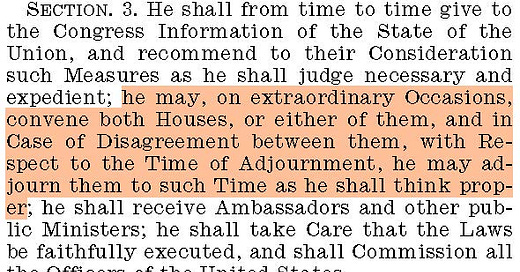Bonus 110: The President's Prorogation Power
The President's (never-exercised) power to involuntarily adjourn Congress might be a lot narrower than it looks—especially if this Supreme Court is ever asked to interpret it.
Welcome back to the weekly bonus content for “One First.” Although Monday’s regular newsletter will remain free for as long as I’m able to do this, much of the bonus content is behind a paywall as an added incentive for those who are willing and able to support the work that goes into putting this newsletter together every week. I’m grateful to those of you who are already paid subscribers, and hope that those of you who aren’t will consider a paid subscription if and when your circumstances permit:
Given that Thanksgiving is tomorrow I thought I’d post this week’s bonus issue a day early—and that I’d use it to follow up on the piece I wrote a few weeks ago on the Recess Appointments Clause. (For those who’d prefer more Thanksgiving-themed fare, you might revisit my Thanksgiving 2022 bonus post.)
When I wrote about recess appointments earlier this month, that piece noted, but didn’t dwell upon, the President’s never-before-used power under Article II, Section 3 of the Constitution to “adjourn” Congress “in Case of Disagreement between [the House and the Senate] with Respect to the Time of Adjournment.” This prorogation power has led to some speculation that, even if the Senate is unwilling to voluntarily adjourn come January 20 so that President Trump can use the Recess Appointments Clause to fill his Cabinet, Speaker Johnson might force a “disagreement” with the Senate as to the time of adjournment of the First Session of the 119th Congress that the President could then use as a pretext for adjourning both chambers.
As I explain below the fold, although this reading is superficially plausible if this single phrase in Article II, Section 3 is read in a vacuum, it runs into difficulty when we consider the rest of that (highlighted) provision; the rest of the Constitution; and … the broader implications of such a view.
Taking the rest of the Constitution first, the President’s prorogation power has to be read alongside Article I, Section 5, Clause 4—which provides that “Neither House, during the Session of Congress, shall, without the Consent of the other, adjourn for more than three days, nor to any other Place than that in which the two Houses shall be sitting.” This provision wouldn’t be worth much if a single chamber could get around it with the President’s help. And as a matter of practical implications, if the President could force Congress to adjourn any time the House is willing to go along, that would open the door to largely sidelining the Senate as an institution—since each successive House could effectively enable the President to fill every federal office through the Recess Appointments Clause. Indeed, it seems odd to imagine that the Constitution would thus allow one chamber of Congress to largely neuter the other.
My own view is that there is a compelling, narrower reading of the President’s adjournment power—that the President may adjourn only those sessions of Congress that he convened—under the “extraordinary occasions” provision of the same clause of Article II, Section 3. Far more importantly, as I explain below, there’s reason to suspect that, if this issue were to make it to the Supreme Court, there may well be five votes in favor of such an interpretation.
Of course, this legal analysis may all be for naught; President Trump may use the mere specter of prorogation to try to leverage the Senate into doing his bidding. And there may never be the type of “disagreement” that would even trigger the broad reading of the President’s prorogation power. But if Trump (and Johnson) were to actually force a test case, it seems better than even odds to me that this Court would rule against them.
For those who are not paid subscribers, the next free installment of the newsletter will drop on Monday morning. For those who are, please read on.
Keep reading with a 7-day free trial
Subscribe to One First to keep reading this post and get 7 days of free access to the full post archives.




